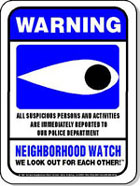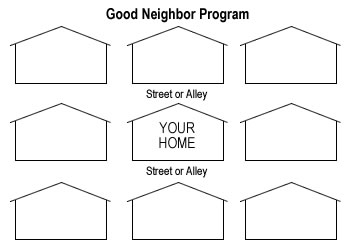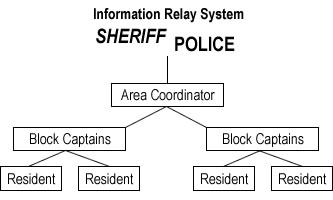| Law
Enforcement officers report substantial decreases in crime
when neighbors unite. A local program like Neighborhood
Watch, Apartment Watch, Block Watch, Town Watch, and Crime
Watch - no matter what it is called - is one of the most
effective answers law enforcement has to stopping crime.
Watch groups build neighborhood togetherness which helps
overcome the isolation created and fed upon by crime.
Neighborhood Watch
groups are extra eyes and ears for reporting crime and
suspicious behavior to law enforcement. They are not
vigilantes. A Watch group is not designed to replace
law enforcement protection; rather it is an extension
or supplement to assist law enforcement in making neighborhoods
safer for all citizens.
Effective law enforcement relies on
early and accurate reporting of criminal activity. Your
neighbors are a vital link to law enforcement in stopping
crime. They know when you are home and what type of
car you drive. A neighbor can be the first person to
spot a burglar in your home, or a strange car in your
driveway. Law enforcement officers use Watch Groups
to educate participants on how to deter crime, delay
criminals from getting away, and detect crimes in progress.
Information concerning immediate criminal activity can
be passed on to participants along with effective strategies
to combat problem areas.
A Neighborhood Watch Group helps create
an identity within the neighborhood, which in turn fosters
a sense of pride and belonging for the members. A Watch
Group makes its neighborhood a safer place to live in
by active attitude. As a result, people become more
aware of strange vehicles, persons, or circumstances.
This will not take a lot of time and soon develops into
a daily habit of being more aware of what is going on
in the neighborhood.
Neighborhood Watch Group programs take
many forms, but in all cases, organization by blocks
is the cornerstone of all citizen crime prevention programs.
Neighborhood Watch Group
A Crime watch unit cannot work well
without citizen volunteers in key positions such as
Area Coordinators to assume certain duties and responsibilities.
The Area Coordinator serves as the main
contact between law enforcement and your neighborhood
watch by receiving information provided by law enforcement
and passing it on to block captains.
 Block
Captains pass on the information received from the area
coordinator to the individual residential households
and recruit replacement block captains when positions
open up. Block Captains also Maintain, update and distribute
New Neighbor Packets and Home Security Manuals to each
of the residents as well as submit Crime
Watch sign requests and funds. Block
Captains pass on the information received from the area
coordinator to the individual residential households
and recruit replacement block captains when positions
open up. Block Captains also Maintain, update and distribute
New Neighbor Packets and Home Security Manuals to each
of the residents as well as submit Crime
Watch sign requests and funds.
(New Neighbor Packets contains a cover
letter, neighborhood phone and/or email list, Nine House
Sheet, various pamphlets, and a McGruff House Application.)
Neighbor Responsibilities
As a crime watch neighbor, your responsibilities
is to be a good neighbor by watching out for one another's
family members, property and by reporting suspicious
activity to the Sheriff's Office or Police Department.
You should know the three (3) neighbors across the street
from your home, on each side, and the three (3) neighbors
behind your residence. YOU should have a heightened
awareness for your neighbor's welfare and you should
be more than willing to report suspicious activity to
the Sheriff's Office or Police Department. Citizens
can be assured that when they report suspicious activity,
their name will be held in strictest confidence.

 Download
Good Neighbor Program, PDF format Download
Good Neighbor Program, PDF format
Information Relay System
The telephone information relay system
is the second part of the Neighborhood Watch Program.
It involves area residences of the crime watch program
who form a system to relay information on suspected
criminal activities in the crime watch area. This information
is provided by law enforcement and is then passed to
each resident. The information can be used by crime
watch participants to identify criminal suspects who
may venture back into the neighborhood.

|
